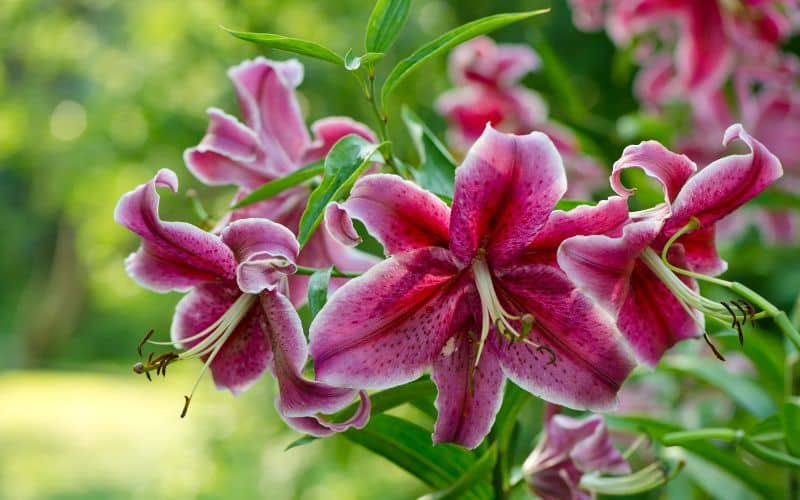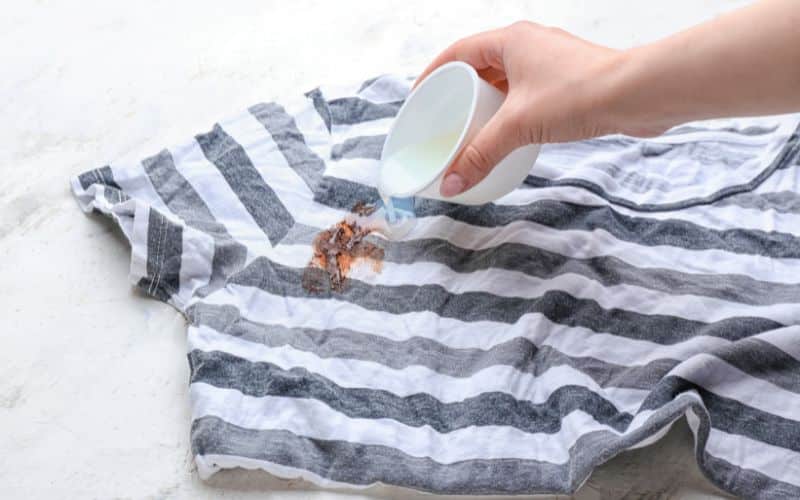
Remember, time is of the essence when dealing with these stains – the sooner you act, the easier it’ll be to restore your clothing to its original condition. So next time you’re admiring these stunning flowers, remember this advice – it could save your favorite outfit from a permanent mark!
Understanding the Stargazer Lily Pollen Problem
Anyone who’s ever had a stargazer lily in their garden, or received one as a gift, knows just how stunning these flowers can be. But they also know that those brilliant blooms come with a not-so-pleasant side effect: bright orange pollen that can stain practically anything it comes into contact with.
Stargazer lilies are notorious for their pollen stains. The pollen is made up of tiny particles that cling to fabric and resist regular washing methods. It’s easy to brush against the stamen—the part of the flower where the pollen is produced—without realizing it, only to discover later an unsightly orange blotch on your clothing.
Pollen stains aren’t just unsightly; they’re incredibly stubborn too. They don’t respond well to ordinary laundry detergents and may even become more set in if treated improperly. This makes them particularly frustrating for clothes-lovers everywhere.
The problem isn’t limited to clothing either. Stargazer lily pollen can stain upholstery, carpets, linens, and other fabrics around your home if you’re not careful. It’s enough to make anyone think twice about bringing these beautiful but troublesome flowers indoors.
But why does this particular type of pollen cause such stubborn stains? The answer lies in its composition. Stargazer lily pollen contains oils that bind easily with fibers in fabric creating durable stains that resist simple cleaning methods.
Herein lies the challenge: How do you remove these tough stains without damaging your beloved garment or home accessory? Fear not! There are ways to tackle this floral foe effectively and efficiently—and we’ll be exploring them in detail throughout this article.
The Science Behind Pollen Stains
Stargazer lilies, while stunningly gorgeous, are notorious for their pollen stains. But what causes these stubborn blemishes? It’s all down to the science behind pollen.
Pollen grains contain natural oils and pigments that make them exceptionally adhesive. When these tiny particles come into contact with fabric, they firmly attach themselves to the fibers. This stickiness is a trait of many pollens – it’s how plants ensure their reproductive material reaches its destination.
In addition to being sticky, stargazer lily pollen is vividly colored. Its bright orange or yellow hue comes from carotenoids, plant pigments also found in fruits and vegetables like carrots and tomatoes. Unfortunately for your laundry, carotenoids are known for creating long-lasting color stains.
Here’s a quick breakdown of what makes up stargazer lily pollen:
| Component | Purpose |
|---|---|
| Natural Oils | Make the pollen sticky |
| Carotenoids | Provide color |
To add insult to injury, heat can set these tough stains further into fabric. So if you’ve accidentally rubbed some on your clothes and then sat out in the sun or tossed your garment in a hot dryer… Well, you’ve got yourself an even more daunting stain challenge.
Interestingly enough though, not all hope is lost when dealing with such invasive stains! Understanding this basic science behind why stargazer lily pollen sticks so tenaciously and colors so vividly can actually help guide your approach towards removing it effectively from fabrics.

Step-by-Step Guide: Removing Lily Pollen from Clothes
If you’ve ever had a brush with a stargazer lily, you know that its pollen can leave a stubborn stain. But don’t worry, there’s good news! It’s entirely possible to get those pesky yellow marks out of your clothes. Here is the step-by-step guide you need.
Avoid touching the pollen with your hands. The first rule of thumb is not to touch the pollen stains. Rubbing it will only push the pollen deeper into the fabric fibers, making it harder to remove later.
Next, remove as much pollen as possible without rubbing it into the fabric. You might wonder how that’s done? Well, using a piece of sticky tape or even gently shaking off loose grains could work wonders here.
Once you’ve removed what you can this way, it’s time for spot treatment. Use a pre-treatment stain remover specifically designed for plant-based stains if one is available at home or at your local store.
- Apply it directly onto the affected area.
- Let it sit and do its magic for about 15 minutes before proceeding to wash.
When washing this particular garment, remember: don’t include other clothes in the same load. The last thing anyone wants is for those bright yellow stains to spread!
The final step in our guide involves checking if any trace of stain remains after washing but before drying. If there’s still residue left:
- Repeat spot treatment
- Wash again
The heat from drying could set any remaining traces permanently into fabric, so always double-check!
Note that different fabrics may require slight variations on these steps due to their unique properties and care instructions; always check garment labels before proceeding with any cleaning process.
Alternative Methods to Tackle Tough Pollen Stains
When it comes to the task of removing stubborn stargazer lily pollen stains, they’re not alone in their struggle. Several alternative methods can come in handy if the typical laundry approach isn’t cutting it.
One tried and true method is sunlight bleaching. They simply need to rinse the stained garment with water, then leave it out in direct sunlight to dry. This process might take a couple of days depending on sunlight exposure, but it’s often successful at lifting those tough pollen stains.
Another technique involves using household products like dishwashing liquid or distilled white vinegar:
- Dishwashing Liquid: It’s gentle enough for most fabrics yet powerful against stains. Apply a little directly onto the stain before laundering as usual.
- Distilled White Vinegar: This pantry staple is great for breaking down stubborn stains due to its acidic nature. Soak the affected area in diluted vinegar (1 part vinegar: 2 parts water) for 30 minutes before washing.
It’s important to remember that these methods work best when tackled as soon as possible after staining occurs.
For those who prefer professional help, turning to a professional dry cleaner may be a good option. These experts have specialized knowledge and tools that can effectively remove even the toughest of pollen stains without damaging delicate fabric fibers.
Finally, some individuals swear by commercial stain removers such as ‘OxiClean’ or ‘Shout’. It’s advisable however, that they always test these products on an inconspicuous spot first, since certain chemicals can cause discoloration or damage on some fabrics.
Here’s a quick summary table of these alternatives:
| Method | Pros | Cons |
|---|---|---|
| Sunlight bleaching | Natural and free | Takes time |
| Household Products (Dish soap/Vinegar) | Cheap and readily available | May not work on old/heavy stains |
| Professional Dry Cleaning | Effective and safe for delicate fabrics | Can be expensive |
| Commercial Stain Removers (‘OxiClean’, ‘Shout’) | Powerful stain removal action | Risk of fabric damage |
These alternative methods provide various ways one can tackle tenacious stargazer lily pollen stains.
Caring for Your Clothes After Stain Removal
Once the stargazer lily pollen stain is removed, it’s essential to care for your clothes properly. Regular maintenance ensures longevity and prevents future staining.
Firstly, it’s best to wash the garment alone after stain removal. This helps get rid of any residual pollen that might have been missed during the cleaning process. It also reduces the risk of cross-contamination with other clothes.
Now, let’s talk about washing settings. Gentle cycles are recommended for most garments post-stain removal. They’re less likely to cause fabric wear or color fading. When dealing with delicate fabrics like silk or linen, hand-washing might be a better option.
Drying is another crucial aspect of clothing care after stain removal. Avoid high-heat drying as this can set in any leftover stains and damage fabric fibers over time.
Here are some key tips when caring for your clothes:
- Wash Alone: Allows thorough cleaning and prevents contamination.
- Gentle Cycle/Hand-Wash: Protects against wear and color fade.
- Low-Heat/Air-Dry: Prevents setting in stains and fiber damage.
Remember, reading your clothing labels is always a good practice! They provide valuable information on how to best take care of your garments.
Lastly, consider using a protective spray designed specifically for fabrics if you often find yourself dealing with tough stains like lily pollen. These sprays create a barrier between the fabric and potential staining agents making stain prevention more effective!
In essence, proper clothing care post-stain removal involves mindful washing and drying practices coupled with preventive measures!

Conclusion: Maintaining a Lily-Pollen-Free Wardrobe
Keeping clothes free of lily pollen can seem like an uphill battle. But armed with the right knowledge and techniques, it’s entirely achievable. A lily-pollen-free wardrobe isn’t just about stain removal—it’s also about prevention.
Firstly, don’t underestimate the importance of handling stargazer lilies correctly. When arranging these beautiful blooms, remember to remove their anthers—the part of the flower that contains pollen—before they open fully. That’ll drastically reduce the chances of getting yellow stains on your clothing.
Next up is regular cleaning. You’ve learned that prompt action is key when treating lily pollen stains. It’s best not to let the stain set in; wash your clothes as soon as possible using a reliable detergent.
A final crucial point worth noting is this—don’t let fear of stains keep you from enjoying stargazer lilies or any other type of bloom! With these preventative measures and cleaning methods at your disposal, you’re more than equipped to enjoy the beauty of flowers without worrying about potential mishaps with your clothes.
Colin Macmillan is a seasoned entrepreneur and the CEO of Riverwood Landscape, a leading landscaping company based in Canada. He has been at the helm of the company since leaving high school, demonstrating his strong leadership skills and business acumen.
Colin’s expertise lies in various aspects of landscaping, including lawn care, interlocking, sod installation, and commercial maintenance. His hands-on approach and dedication to the craft have been instrumental in building Riverwood Landscape into a reputable brand.
One of his most notable achievements is the creation of a successful landscape franchise that services multiple locations. This accomplishment underscores his strategic thinking and ability to scale operations effectively.
Colin has also had the privilege of working with Guelph Hospital for landscaping and maintenance, a testament to the trust and reliability that his company has earned over the years.
His professional mission is to offer the best services and experiences for customers, a goal that he tirelessly pursues. Colin’s commitment to excellence and customer satisfaction continues to drive the growth and success of Riverwood Landscape.








